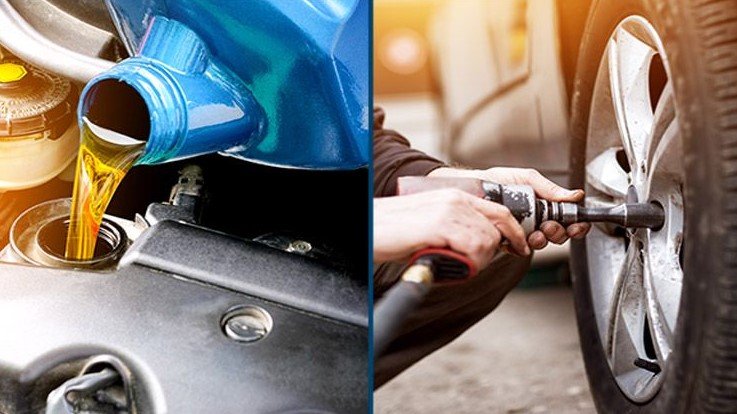
Oil Change and Tire Rotation: Keeping Your Vehicle in Prime Condition
Introduction
Maintaining your vehicle goes beyond simply filling up the gas tank and washing it regularly. Two crucial aspects of vehicle maintenance are oil changes and tire rotations. Regularly tending to these tasks not only ensures the longevity of your vehicle but also contributes to your safety on the road.
Understanding Oil Changes
Importance of Oil Changes for Engine Health
The engine is the heart of your vehicle, and proper lubrication is essential to keep it running smoothly. Over time, oil becomes contaminated with dirt and debris, which can cause friction and premature wear on engine components.
Recommended Frequency for Oil Changes
Experts recommend changing your vehicle’s oil every 3,000 to 5,000 miles, depending on your driving habits and the type of oil used. Following the manufacturer’s guidelines is crucial to maintaining optimal engine performance.
Signs That Indicate the Need for an Oil Change
Keep an eye out for warning signs such as dark or gritty oil, engine knocking noises, or the oil change indicator light on your dashboard. Ignoring these signs can lead to engine damage and costly repairs.
Benefits of Regular Oil Changes
Improved Engine Performance and Longevity
Fresh oil provides better lubrication, reducing friction and heat buildup within the engine. This helps to prolong the life of engine components and ensures smoother operation.
Prevention of Costly Repairs
Regular oil changes can help to prevent issues such as engine sludge buildup, which can lead to engine failure if left unchecked. By investing in routine maintenance, you can avoid expensive repairs down the road.
Better Fuel Efficiency
A well-lubricated engine operates more efficiently, resulting in improved fuel economy. Over time, the savings on fuel costs can offset the expense of regular oil changes.
The Role of Tire Rotation
Explanation of Tire Rotation and Its Purpose
Tire rotation involves moving the tires from one position to another on the vehicle at regular intervals. This helps to ensure even wear on all four tires, prolonging their lifespan and improving overall performance.
Recommended Frequency for Tire Rotation
Tire rotation should be performed every 6,000 to 8,000 miles, or as recommended by your vehicle manufacturer. This interval may vary depending on factors such as tire type, driving conditions, and vehicle weight distribution.
Advantages of Tire Rotation
Balanced Tire Wear for Extended Tire Life
Uneven tire wear can lead to premature tire replacement and compromise safety on the road. Regular tire rotation promotes balanced wear patterns, allowing you to get the most mileage out of your tires.
Enhanced Safety and Handling
Properly rotated tires provide better traction and stability, especially in adverse weather conditions. This improves overall handling and reduces the risk of accidents due to tire-related issues.
Savings on Tire Replacement Costs
By maximizing the lifespan of your tires through regular rotation, you can save money on frequent replacements. This is particularly beneficial for those driving vehicles with high-performance or specialty tires.
DIY Oil Change and Tire Rotation
Step-by-Step Guide for Performing an Oil Change at Home
Performing an oil change at home can save you time and money, provided you have the necessary tools and follow proper procedures. Be sure to dispose of used oil responsibly at a designated recycling facility.
Tips for Safely Rotating Tires on Your Own
Rotating tires involves lifting the vehicle and removing the wheels, so it’s essential to use proper lifting equipment and follow safety precautions. Refer to your vehicle owner’s manual for specific jacking points and torque specifications.
Professional Oil Change and Tire Rotation Services
Benefits of Entrusting Maintenance to Professionals
While DIY maintenance is an option for some, many prefer to leave oil changes and tire rotations to trained technicians. Professional service ensures that the job is done correctly and efficiently, giving you peace of mind on the road.
Assurance of Quality Service and Proper Disposal of Fluids
Certified service centers use high-quality oil and filters tailored to your vehicle’s specifications. Additionally, they adhere to environmental regulations when disposing of used oil and other fluids, minimizing environmental impact.
Common Mistakes to Avoid
Overlooking Maintenance Schedules
Neglecting to adhere to recommended maintenance intervals can result in unnecessary wear and tear on your vehicle. Stay on top of oil changes and tire rotations to keep your vehicle running smoothly.
Neglecting to Check Tire Pressure
Proper tire inflation is essential for optimal performance and safety. Routinely check tire pressure and adjust as needed to maintain the correct psi recommended by the manufacturer.
Using Incorrect Oil or Neglecting to Change Filters
Using the wrong type of oil or neglecting to replace oil filters can compromise engine performance and lead to costly repairs. Always use the oil viscosity recommended for your vehicle and replace filters according to the manufacturer’s guidelines.
Conclusion
Regular oil changes and tire rotations are essential components of vehicle maintenance that should not be overlooked. By investing in these routine tasks, you can ensure the longevity of your vehicle, improve performance, and enhance safety on the road.
FAQs
- How often should I change my vehicle’s oil?
- It’s recommended to change your oil every 3,000 to 5,000 miles or as specified in your vehicle’s owner’s manual.
- Do I need to rotate my tires if I have all-wheel drive (AWD) or four-wheel drive (4WD)?
- Yes, tire rotation is necessary for all vehicles to promote even wear and extend tire life, regardless of the drivetrain system.
- Can I use any type of oil for my vehicle, or do I need a specific kind?
- It’s crucial to use the oil viscosity recommended by your vehicle manufacturer to ensure proper lubrication and engine performance.
- How do I know when it’s time to rotate my tires?
- Tire rotation is typically recommended every 6,000 to 8,000 miles, but you should consult your vehicle owner’s manual for specific guidelines.
- Is it safe to perform oil changes and tire rotations at home, or should I always go to a professional?
- While DIY maintenance is an option for some, others prefer to have these tasks




